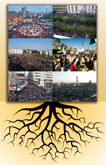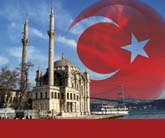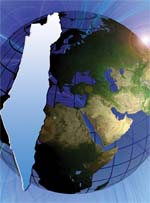×


We have detected your country as:
Please click here to go to the USA website or select another country from the dropdown list.

{image_2} On September 21, 2011, US President Obama proclaimed at the UN General Assembly, “There is one issue that stands as…a test for American foreign policy, and that is the conflict between the Israelis and the Palestinians.” President Obama assumes that the Palestinian issue is a root cause of Middle Eastern turbulence, the crown jewel of Arab policy-making, and the crux of the Arab–Israeli conflict. Is it?
Continue Reading »
{image_1}Israel’s relationship with Europe is complex to say the least. Anti-Semitism is on the rise, and Israel is routinely assailed by pro-Palestinian activists on the continent. At the same time, Germany has sold multiple nuclear submarines to Israel, and the British finally changed a law that results in less legal harassment for Israeli officials visiting the country. Two of Israel’s closer friends have recently been forced out of power, but one of their stronger critics was too. So, is the relationship getting better, worse, or staying the same? It depends on where you look.
Continue Reading »
{image_1}Turkey’s Ascension in the New Middle East
A political earthquake has ripped across the Middle East and North Africa in the last year, toppling several longstanding dictators in its wake. Some of the region’s most well-known names are gone, while a once-dominant nation appears poised to seize the chaotic opportunity to return to regional superpower status: Turkey. The Islamic-influenced—but technically secular—country once ruled the Middle East as the Ottoman Empire, and now they are using rhetoric, threats, and money to gain influence in the Arab Spring-transformed region.
Continue Reading »
{image_1}Legend has it that a scorpion and a camel were sitting on the shores of the River Nile one hot summer’s day. The scorpion asks the camel to allow him to sit on his hump in order to ride to the other side. Scorpions, as is commonly known, can’t swim. Reluctantly the camel agrees. Half way across, the scorpion stings the camel. Realizing they’re now both going to drown, the startled camel asks the scorpion, ”Why?” With a grin, the scorpion answers, ”Welcome to the Middle East.”
Continue Reading »
{image_1}One of Gilad Shalit’s comments during his first interview upon his release was that he had imagined himself in captivity for many more years. And he was not alone. Although there was tremendous momentum worldwide to secure his freedom, many, if not most, authorities on the subject viewed it as a hopeless situation.
Continue Reading »
{image_1}Israel played a role in developing the cell phone; it has an important research location for the Intel computer processor; it’s one of the first nations to help disaster-struck Haiti; and it’s a world-leader in defense technologies. Yet, it’s a tiny country consisting of roughly 7 million people and a territory about the same as Wales, the state of New Jersey, or Kruger National Park in South Africa. Prior to recent natural gas discoveries, it was generally considered devoid of natural resources.
Continue Reading »
{image_1}There is a word in Hebrew that is used often in certain segments of Israeli society that denotes a very important but strangely illusive concept for the modern state. The word is hasbara, and it refers to Israel’s public diplomacy efforts. It is a noun that actually means “explanation,” and many from Israel, including her Christian friends, are engaged in what is called “doing hasbara.” It is traditionally one of the few things that the nation of Israel has not excelled at.
Continue Reading »
{image_1} A key official with Hamas told the Palestinian Ma’an News Agency that they would be willing to accept a Palestinian state on the 1967 lines—regarding the West Bank [Judea and Samaria], East Jerusalem, and the Gaza Strip—but that they would not recognize Israel. Comments by Mahmoud al-Zahar, cofounder of Hamas, to Ma’an radio imply that, for Hamas, the creation of a Palestinian state could result in a long-term truce with Israel, but would not lead to permanent peace with Israel. Zahar said that formally recognizing Israel would threaten to prevent millions of Palestinian refugees and their descendants from coming to Israel as well as “cancel the right of the next generations to liberate the lands [presumably the rest of Israel].”
Continue Reading »
{image_1} It’s perhaps the most oft-mentioned year in Israeli–Palestinian diplomacy, and yet it might be the worst understood concept in the decades-old conflict. Discussed by politicians and commentators alike, the 1967 “borders” have been presented even by US President Barack Obama as a starting point for Israeli–Palestinian negotiations. There are numerous problems with that approach, not the least of which is that the 1967 lines are not borders, nor have they ever been.
Continue Reading »
{image_1}The scenario is presented as dramatic and disturbing: Sometime this September, the United Nations could recognize Palestinian statehood in terms Israel could never accept for historic or security reasons. As a result, it is feared Israel could be cast into a diplomatic tailspin that could culminate in international sanctions and even conflict. It’s presented as one of Israel’s worst nightmares, and opinions expressed in Israeli media from the Left and the Right are already sounding the alarm. But are the fears justified? Is Israel really facing its worst diplomatic crisis in decades? Or is the whole scenario a Palestinian fantasy?
Continue Reading »All logos and trademarks in this site are property of their respective owner. All other materials are property of Bridges for Peace. Copyright © 2024.
Website Site Design by J-Town Internet Services Ltd. - Based in Jerusalem and Serving the World.